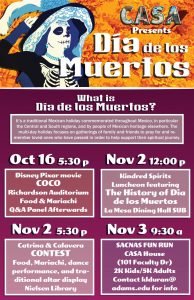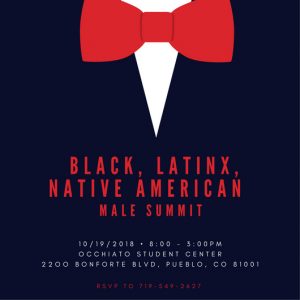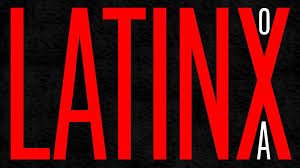
Discussion about DACA
Film screening, followed by a panel discussion addressing
differing opinions on DACA (Deferred Action on Childhood Arrivals) reform.
Wednesday Sept. 26, 2018
Adams State University
McDaniel Hall 101
6:00 p.m
• This will be a safe place to ask questions and share your thoughts.
Sponsored by: SLV Immigrant Resource Center, Community
Foundation of SLV, and the ASU Spanish Club.
To see the flyer, click: DACA discussion
Hispanic Serving Institution Week
HSI week kicks-off with the second annual Adams State Theatre Ghostlight Project. A reception will begin at 6:30 p.m. Saturday, Sept. 8, in the Theatre Building. Led by Dr. John Taylor and inspired by the tradition of leaving a “ghost light” on in a darkened theatre, campus and community members will make or renew a pledge to stand for and protect the values of inclusion, participation, and compassion for everyone regardless of race, class, religion, country of origin, immigration status, (dis)ability, gender identity, or sexual orientation.
Art and music will be featured on September 11. Beginning at 3 p.m. until 4 p.m., Dr. Leslie Macklin, a Title V Equity Engagement Grant recipient, will present a hands-on workshop in the ASU Art Building, Traditions in Native Ceramics. Macklin, along with her ASU students, will lead the workshop. Starting at 5:30p.m. in Richardson Hall a reception will feature Roberto Capocchi, a classical guitarist. At 6 p.m., the Adams State music faculty will perform in Richardson Hall Auditorium, ETHOS: Exploring Equity Through Music. Dr. Matthew Valverde, Dr. Angela Winter, Dr. Beth Robison, and Dr. James Doyle; were recipients of Title V Equity Engagement Grants.
On September 13 and September 14, the Adams State Office of Title V Initiatives will host panelists followed by round table discussions. Beginning at 4 p.m. the Thursday event will feature Great Stories – Latino Males in Higher Education and Friday will feature Great Stories – Empowering Women, A Call to Action. The sharing of Great Stories will be held in Carson Auditorium and the round table discussions in the Student Union Building banquet rooms
An e-book written by our own Dr. Marco Polo
Marco Polo has written about the bi-national social support and the stories of Mexican agricultural migrants in Oregon. Unfortunately, the file is too big to link to the blog page (unless someone knows how to do it. I have a copy if you would like to read it.
“Experiencias de Apoyo Social Binacional e Historias de Vida de los Migrantes Agrarios de la Región Mixteca Oaxaqueña en el Estado de Oregón, EUA, a Través de un Programa de Alcance a la Comunidad”
¿Y Cómo se Llama el Niño?
…Se Llama Juan Diego.

Collaboration with other LatinX groups with an app. Chevere!
Perhaps this will motivate us to reach out to students:

Palante Latinx has a section on the app with Latinx-specific call-to-actions like subscribing to podcasts, supporting POC businesses, and attending events like film festivals. You can download the app and subscribe to Palante Latinx here:http://bit.ly/2FHu8cf
Magnify Progress and I would love to collaborate with students groups in a way that will enhance social change and action. Would you be interested in discussing further?
Regardless, we would love to have your feedback on your app experience and needs as a community: https://goo.gl/forms/aT86xIure9S4GZgq2
An article that is especially pertinent….
Because of where we work and live, this article struck home. Keep reading, because it gets most interesting (to me at least) after the first several paragraphs.
The Next Populist Revolution will be Latino.
https://www.theatlantic.com/magazine/archive/2018/09/the-next-populist-revolution-will-be-latino/565730/
National Day of Action Against ICE
Is anyone interested in this?

On July 31st, it is all of our duties to expose how ICE is working in our cities. We can not let ICE target our communities without check. ICE doesn’t operate alone. We will demand that our cities, counties, companies, and all institutions end their cooperation with ICE. We will not allow our cities and resources to be used as tools to keep immigrants and their children hostage.
Amazon provides the technology that allows ICE to separate families and terrorize the immigrant community.
I cannot be a bystander as Amazon facilitates the criminalization of my immigrant community. I won’t be complicit as Amazon upholds the ICE deportation machine. It is our moral duty to stop cooperating with ICE and demand the institutions we are part of do the same.
ICE relies on private tech companies to develop their surveillance technology. ICE relies on airlines to deport people. ICE relies on departments of labor, schools, DMVs and hospitals to share their records with them, helping them persecute undocumented people.
This action is only the beginning.
Opportunity for LatinX Compañeros
2018 Black, Latinx, & Native American Male Summit
Friday, October 19, 2018
8am-3pm ( Breakfast and Lunch provided)
Colorado State University Pueblo
2200 Bonforte Blvd, Pueblo, CO, 81008
CALL for Proposals
We also invite you to bring your students. Student cost is $10 per student for the whole day of events.
The four-year college graduation rate for Black and Latinx males is 52 and 58 percent, respectively, compared to 78 percent for White males. Colorado also has graduation rates below 60 percent for Black and Latinx males, with even lower graduation rates for Native American males. Given the demographics of Southern Colorado and CSU-Pueblo’s status as a Hispanic Serving Institution, the University has committed to offering a program to Black, Latino, and Native males in southern Colorado which helps them understand the importance of their pursuit of a college education as well as the availability of resources to help them succeed.
The theme of the 2018 Black, Latinx, Native Male Summit (BLNMS) is Leading the Pack: Understanding our past, influencing our present to create change in our futures. This year’s first annual summit strives to provide a forum for Black, Latinx, and Native men to discuss the past and the influence it plays on our campuses to create change for future generations to come. The summit will provide opportunities to engage in dialogue, create bridges of collaboration, and inspire leadership among males on campus. The presenters, organizers, and sponsors hope to promote coalition building, community, and mentorship for Black, Latinx, and Native men across Southern Colorado.
Summit organizers are seeking the submission of one-hour session proposals that
- Provide participants with knowledge, skills, and strategies that they can apply to their lives and/or the lives of their families and communities.
- Interaction and creativity.
Sessions may take the form of a discussion, a workshop, or a panel.
- Discussion/Panel – A group of two or more panelists engaging in a discussion amongst each other and the audience
- Workshop – A presentation combined with an activity or series of activities surrounding the presentation topic
For the 2018 program, summit organizers invite proposals focused on the following topics related to Black, Latinx, and Native engagement:
Being Black, Brown, and Native in America through the decades: Sessions may focus on the day-to-day experiences of Black, Latinx, and Native males in America then and now. Topics might include masculinity, criminalization, and other overarching challenges of men of color living in the U.S.
Black, Brown, and Native Excellence in Higher Education: Sessions on this topic would focus on the academic and professional enhancement of young Black, Latinx, and Native men in higher education institutions. Submissions may include research and practices that lead to Black, Latinx and Native male success, retention, and mentor-ship.
Coalition-Building: This program area will focus on the successful approaches and practices of intercultural interactions amongst Black, Latinx, and Native organizations and student groups. Submissions may include examples of historical and contemporary collaborations between Black, Latinx, and Native men or the development of leadership skills that enable these young men to move forward.
Leading the Pack: This area will focus on any topics or issues in the Black, Latinx, and Native culture that incorporate leadership. This session type may also include topics in regards to programs, partnerships, or people who have been successful or who have set high standards, etc.
Proposals can be submitted on the following link:
Off Campus Submissions: https://goo.gl/forms/aNWJuiv2N6GxbjSF3
CSU-Pueblo Campus Submission: https://csupueblo.collegiatelink.net/form/start/104375
What does LatinX mean?
Identity labels constantly change because society and identities themselves are in constant flux. “LatinX” is an inclusive, gender-neutral term that refers to people of Spanish-speaking Latin American descent. It is meant to replace Latino/a, or Latin@, but is often used interchangeably with “Hispanic” or “Chicana/o” (though Chicana/o refers only to people of Mexican descent, not all LatinX people).

Most agree that LatinX should be pronounced as if you were saying Latino but–obviously–replacing the last letter with X; i.e., Lahteen X. That said, you’ll probably hear it more often pronounced as Latin (the dead Roman language) X.
¡Bienvenidos!
The Adams State LatinX * Caucus meets regularly to discuss issues involving the LatinX community and acts to promote diversity on campus.** If you would like to be added to our email list, please contact Mari Centeno at LMCENTENO@adams.edu
*See the post about what “LatinX” means
**See our Mission Statement